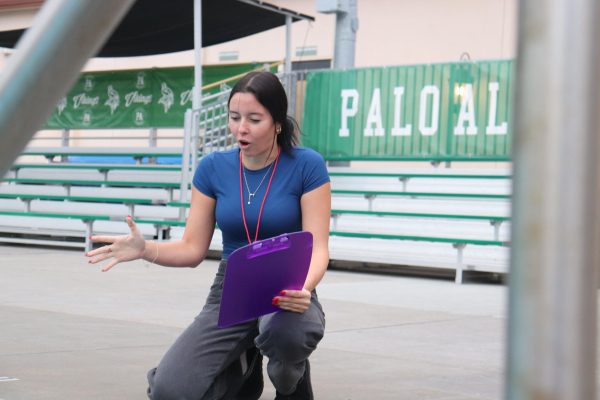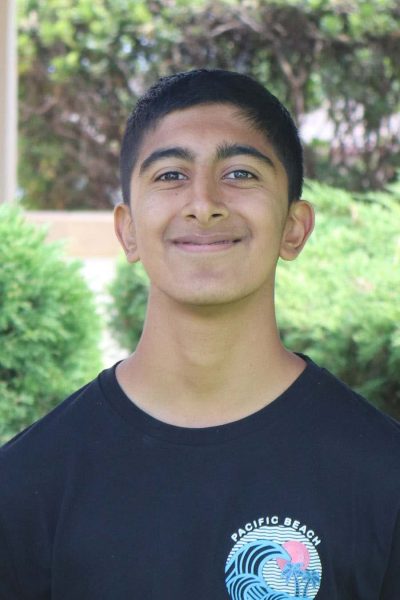The field buzzes with excitement as cheers from parents and student-athletes echo through the air. Coach Ian Johnston, a junior at Paly, paces the field deep in thought, searching for the play that will win his team the match.
For many Paly athletes, the thrill of the game isn’t enough— they also want to inspire the next generation. These students are coaching young athletes, sharing their passion for the game, and helping youth build skills while deepening their own connection to the sport.
Having received many years of coaching and expertise themselves, a transition into coaching can be a natural progression. Local grassroots programs provide coaching opportunities for those interested: a fact many students are taking advantage of.
Junior Liam Johnson plays as a forward for Silicon Valley Soccer Academy and coaches during the summer at its sister club, Palo Alto Soccer Club.
“I decided to start coaching to be around the field after my tournaments, during my off-season,” Johnson said. “I think I just really love the sport, and the community that Palo Alto Soccer Club and SVSA have built locally.”
Coaches play a big part in the development of athletes, and accomplished student-athletes have the privilege of playing high-caliber games, experiences which they can use to benefit the athletes that they are coaching.
Many athletes recall fond memories regarding their own coaches and the encouragement they received from a young age. Junior Ben Zhu shares his experience as a youth player and explains how his coaches influenced his basketball philosophy.
“I really liked my middle school coach, Coach Pat,” Zhu said. “He mostly just let me do my own thing, and that’s how he shaped my coaching style. I want my players to play how they want; it’s the most natural and most fun for them.”
Other coaches get the most inspiration from mentors after they start coaching, inspiring them to continuously improve their coaching techniques.
“Last summer, I had two guys that were in their twenties that just moved here internationally, and they were really awesome mentors,” Johnson said. “They taught me how to improve my coaching, and how to get kids to understand and be excited about the sport.”
Additionally, coaching can help athletes gain a deeper understanding of tactics and strategies that they can apply to their own game.
“[Coaching] has made me understand my game a little bit more, even though the kids are in elementary school, it’s made me just understand how important some of the basics are,” Johnson said. “I think I’ve actually learned the most from the kids that have never touched the soccer ball, and they’re like, I want to be playing in the scrimmage at the end of the week, get me there, and it’s like, where do I start?”
Furthermore, sometimes the fundamentals of a sport, which athletes haven’t thought about in years, can be reinforced through teaching youth.
“I think it was really helpful to have coached before because it was just something where it helps you hammer in those basics,” Johnson said. “Things like checking your shoulder, where sometimes it’s like, I’ve been playing my whole life, I don’t even need to check my shoulder, but you have to because that’s how you can tell if there’s space.”
However, coaching as a teenager can have many drawbacks. For one thing, they often struggle to gain the respect and confidence of the athletes’ parents. In many cases, this can cause feelings of self-doubt and uncertainty about their leadership, in what is often their first position of authority. Johnston explains that in football, sometimes the hardest decisions are best for the team.
“A really difficult thing that’s really important is to find the balance between what’s good for the team and what will make people happy,” Johnston said. “Substituting kids in and out is sometimes really hard because you have to get everyone to play, and someone is always going to be disappointed.”
Even at a club or recreational level, athletics are very important to both kids and parents, which can often put lots of pressure on the coaches’ young shoulders. Many parents are often vocal in their criticism, making it easy for young coaches to lack confidence in their abilities, something that all coaches face, even at the professional level. Junior water polo coach Maeva Herbert-Paz shares this experience.
“Very often, parents can get overly involved, and in some cases interfere with the game,” Herbert-Paz said. “This makes the water polo games really intense, and I think that parents should just come to the games to support their kids.”

To many coaches, the spectators are as much part of the game as the players. Johnston explains how he’s learned to focus solely on his team, rather than external pressures.
“Last year, a kid’s dad texted us through this kid’s phone and was wondering why his son wasn’t starting as quarterback,” Johnston said. “I don’t think these things really affect me, because I don’t really care what the parents think.”
Many student coaches also struggle with earning the respect of their peers, as many students feel that because of the close age gap, their coaches are more of a friend. Senior Justin Lee, who coaches a local ultimate frisbee team, shares his struggles with getting through to players.
“One thing I think that frisbee teaches the middle schoolers is that you can’t win all by yourself.” Lee said. “In frisbee, you have to have at least two players to score and that really helps with ‘ball hogs’ as they learn that they have to trust their teammates and understand that it’s a team game.”
While most athletes just have to balance their athletics with schoolwork, student coaches experience increased difficulty and added responsibility balancing their coaching with other activities. Similar to athletes, many coaching positions require hours upon hours of work off the field, coordinating practices, traveling to games, and addressing the needs of the team.
“I have to spend a lot of time creating lineups, to make sure all my athletes play equally,” Junior and middle-school basketball coach Kamili Fossati-Moiane said. “I also have to think of drills and exercises for my players to do during practice.”
Playing a sport along with coaching is difficult in many ways, but being able to balance can be the key to success. Oftentimes, athletes who juggle both playing and coaching struggle with time management and scheduling issues.
“Luckily for me, it’s the same sport and the coach runs the program that I play, so I have the opportunity to make my schedule easily around my sports schedule, making the hours more flexible,” Herbert-Paz said.
Youth coaching can be considerably more arduous than high school and professional sports, in that the kids may be at all different levels, both physically and mentally. While high school athletes generally have been playing the sport for multiple years, young children might be afraid to come out of their shell.
“I used to be shy, so I think that we help bring them out of their comfort zone by doing team-building exercises as well as pairing up players for drills and throwing which helps them be more willing to join in on drills and games.” Lee said.
A key struggle that coaches deal with is organizing practices. As a coach, they have to coordinate practices that will help the team improve and get better. However, this oftentimes requires lots of time, effort and stressfrom the coaches.
“I feel that coaching takes more time than people think, for me it’s around six to seven hours a week for coaching, which requires a lot of time and commitment from me.” Zhu said.
There is also additional time required to make plays and to plan out game plans during the game weeks.
“My usual plan is to draw out a playbook before the season starts and use that for the rest of the season,” Zhu said. “Making the playbook only takes a couple hours and I can look up plays on the internet to help with that process.”
Johnson doesn’t see his many responsibilities as chores: it’s an enjoyable experience that helps him better connect with his athletes.
“Over the summer, my responsibilities vary day by day, but it’s usually I have to be there, helping or leading drills for the kids, and it’ll be me working with them and teaching, providing tips on how they can improve and get better, and being supportive,” Johnson said. “Obviously, if someone gets a little bit of a bloody nose, then I have to deal with some first aid, but my responsibilities are kind of just to be like a fun, helpful person, to encourage kids to learn and get into the sport.”
Mistakes and setbacks can teach young coaches valuable lessons: not only about the sport, but also how to encourage and motivate their kids after a loss.
“When we lose a game or don’t play to our standards it always lights a fire under our players, it causes the players to bring greater intensity to our practices and hold each other accountable,” Johnston said.
In many cases, a loss at the beginning of the season can actually help, as it allows for wounds to be healed and progress to be made, also allowing a coach to build a humble and overconfident team.
“Last year we steamrolled our first two opponents and came into our third game cocky and underestimating our opponent. We played a close game and the refs made some game changing calls, but we ended up losing by one.” Johnston said. “We ended up winning out the season, and when we met that team in the playoffs we came ready and had a convincing win over them, I feel like that was in big part because that early loss gave us.”
Despite this, coaching is no easy task. Many challenges can often arise when coaching students whether it’s between multiple kids or disciplinary issues between a single athlete, young coaches definitely have their hands full. Kids disagree all the time, both on and off the field. Sometimes these turn into big issues, but often times, it’s just small disagreements between athletes. As a camp coach, Johnson has to deal with new kids each week, most of which have never met each other before.
“Usually, the conflicts between the kids are silly, it’s like someone thinks the ball went into the net, or someone else doesn’t,” Johnson said. “I would actually say the most common one is when the kids complain that teams aren’t fair. To calm things down I’ll say, ‘Okay, we’re gonna play, and we’ll play for five minutes and see what the score is.’ After that, we can change teams, or if it gets to a certain score, I’ll jump in myself.”
In other cases, conflict can help form bonds between athletes, which can put them on the road to success.
“I feel that Ultimate, like many other sports, helps students understand how to communicate with each other through issues.” Lee said. “When I come back every year, I see that the kids have learned to be more responsible, respectful, and resilient when they face new challenges.”
Another challenging aspect of coaching is the psychological aspect. Quite often, young athletes will get frustrated and can be too harsh on themselves. Johnson explains how athletes’ reactions can be a tell-tale sign of their mental strength.
“I think the biggest thing though, is just seeing the mistakes that kids make and the reactions they have to those mistakes,” Johnson said. “I’ve seen that the kids that are the most successful are the ones that have minimal reaction to the mistake. That’s been, I think, the biggest thing that I’ve seen with the working with the kids at summer camp that I’ve tried to green in my own playing, which is like the ability to just move.”
The ability to pick oneself up is something Johnson admires and strives to apply to his game, noting that it’s one of the most important things that coaching has taught him.
“I think that’s been the big thing for me, where it’s like some mistakes happen and you just have to move on,” Johnson said. “I’ve tried to ingrain this in my own playing, the ability to just move on. They have other ideas floating around in their head, but their ability to move is just very impressive in my eyes.”
As time goes on, and coaches get to work more with individual players, a strong bond begins to form between coaches and players.
“One of my proudest moments was when there were two boys that were probably eight years old that didn’t know how to play soccer at all. By the end of the week, they were probably in the top three or four kids in the entire camp,” Johnson said. “I worked with them all week and they thanked me at the end of the week for getting them into the sport.”
Johnston has worked with the same group for over two and a half years, and he sees great progress in his players, not only in their ability but also in their character.
“I’ve been impressed with my quarterback Dylan [Goodwin],” Johnston said. “He’s a very focused and motivated player and his progress this season has been outstanding. His coachability has made my experience coaching a lot easier, and I think he has a bright future ahead of him.”
“The biggest thing that I’ve learned is that you have to be patient, communicate directly what you want to happen with demos and examples,” Lee said. “Coaches need to be flex able because not everything is going to go perfect, but make sure that what you are teaching is fun.”
The experience of coaching a youth team provides all coaches with a valuable experience that they will take away with them for the rest of their lives. Not only can they learn to be a leader and how to juggle many different components of coaching, they can also learn from their own athletes values of resilience and perseverance that they can use in their future.






